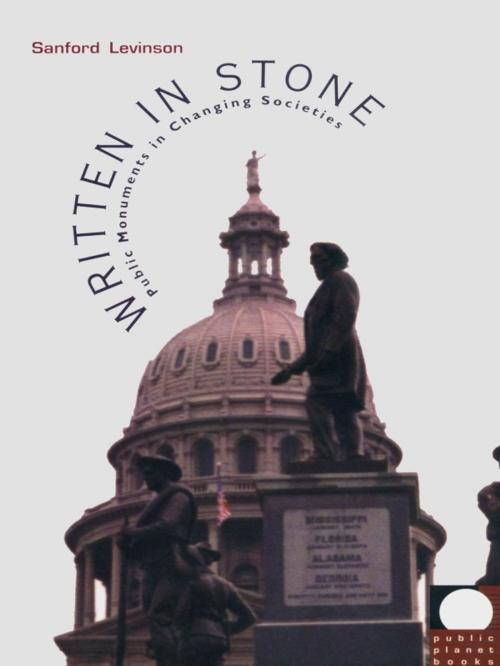Written in Stone
Public Monuments in Changing Societies
Nonfiction, Social & Cultural Studies, Social Science, Anthropology| Author: | Sanford Levinson | ISBN: | 9780822399995 |
| Publisher: | Duke University Press | Publication: | August 7, 1998 |
| Imprint: | Duke University Press Books | Language: | English |
| Author: | Sanford Levinson |
| ISBN: | 9780822399995 |
| Publisher: | Duke University Press |
| Publication: | August 7, 1998 |
| Imprint: | Duke University Press Books |
| Language: | English |
Is it “Stalinist” for a formerly communist country to tear down a statue of Stalin? Should the Confederate flag be allowed to fly over the South Carolina state capitol? Is it possible for America to honor General Custer and the Sioux Nation, Jefferson Davis and Abraham Lincoln? Indeed, can a liberal, multicultural society memorialize anyone at all, or is it committed to a strict neutrality about the quality of the lives led by its citizens?
In Written in Stone, legal scholar Sanford Levinson considers the tangled responses of ever-changing societies to the monuments and commemorations created by past regimes or outmoded cultural and political systems. Drawing on examples from Albania to Zimbabwe, from Moscow to Managua, and paying particular attention to examples throughout the American South, Levinson looks at social and legal arguments regarding the display, construction, modification, and destruction of public monuments. He asks what kinds of claims the past has on the present, particularly if the present is defined in dramatic opposition to its past values. In addition, he addresses the possibilities for responding to the use and abuse of public spaces and explores how a culture might memorialize its historical figures and events in ways that are beneficial to all its members.
Written in Stone is a meditation on how national cultures have been or may yet be defined through the deployment of public monuments. It adds a thoughtful and crucial voice into debates surrounding historical accuracy and representation, and will be welcomed by the many readers concerned with such issues.
Is it “Stalinist” for a formerly communist country to tear down a statue of Stalin? Should the Confederate flag be allowed to fly over the South Carolina state capitol? Is it possible for America to honor General Custer and the Sioux Nation, Jefferson Davis and Abraham Lincoln? Indeed, can a liberal, multicultural society memorialize anyone at all, or is it committed to a strict neutrality about the quality of the lives led by its citizens?
In Written in Stone, legal scholar Sanford Levinson considers the tangled responses of ever-changing societies to the monuments and commemorations created by past regimes or outmoded cultural and political systems. Drawing on examples from Albania to Zimbabwe, from Moscow to Managua, and paying particular attention to examples throughout the American South, Levinson looks at social and legal arguments regarding the display, construction, modification, and destruction of public monuments. He asks what kinds of claims the past has on the present, particularly if the present is defined in dramatic opposition to its past values. In addition, he addresses the possibilities for responding to the use and abuse of public spaces and explores how a culture might memorialize its historical figures and events in ways that are beneficial to all its members.
Written in Stone is a meditation on how national cultures have been or may yet be defined through the deployment of public monuments. It adds a thoughtful and crucial voice into debates surrounding historical accuracy and representation, and will be welcomed by the many readers concerned with such issues.















